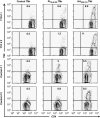Insulin gene VNTR genotype associates with frequency and phenotype of the autoimmune response to proinsulin
- PMID: 20054344
- PMCID: PMC2845516
- DOI: 10.1038/gene.2009.108
Insulin gene VNTR genotype associates with frequency and phenotype of the autoimmune response to proinsulin
Abstract
Immune responses to autoantigens are in part controlled by deletion of autoreactive cells through genetically regulated selection mechanisms. We have directly analyzed peripheral CD4+ proinsulin (PI) 76-90 (SLQPLALEGSLQKRG)-specific T cells using soluble fluorescent major histocompatibility complex class II tetramers. Subjects with type I diabetes and healthy controls with high levels of peripheral proinsulin-specific T cells were characterized by the presence of a disease-susceptible polymorphism in the insulin variable number of tandem repeats (INS-VNTR) gene. Conversely, subjects with a 'protective' polymorphism in the INS-VNTR gene had nearly undetectable levels of proinsulin tetramer-positive T cells. These results strongly imply a direct relationship between genetic control of autoantigen expression and peripheral autoreactivity, in which proinsulin genotype restricts the quantity and quality of the potential T-cell response. Using a modified tetramer to isolate low-avidity proinsulin-specific T cells from subjects with the susceptible genotype, transcript arrays identified several induced pro-apoptotic genes in the control, but not diabetic subjects, likely representing a second peripheral mechanism for maintenance of tolerance to self antigens.
Figures




Similar articles
-
Class III alleles at the insulin VNTR polymorphism are associated with regulatory T-cell responses to proinsulin epitopes in HLA-DR4, DQ8 individuals.Diabetes. 2005 Dec;54 Suppl 2:S18-24. doi: 10.2337/diabetes.54.suppl_2.s18. Diabetes. 2005. PMID: 16306335
-
Avidity-dependent programming of autoreactive T cells in T1D.PLoS One. 2014 May 20;9(5):e98074. doi: 10.1371/journal.pone.0098074. eCollection 2014. PLoS One. 2014. PMID: 24844227 Free PMC article.
-
The insulin gene is transcribed in the human thymus and transcription levels correlated with allelic variation at the INS VNTR-IDDM2 susceptibility locus for type 1 diabetes.Nat Genet. 1997 Mar;15(3):293-7. doi: 10.1038/ng0397-293. Nat Genet. 1997. PMID: 9054945
-
Proinsulin-a pathogenic autoantigen in type 1 diabetes.Autoimmun Rev. 2003 Jun;2(4):204-10. doi: 10.1016/s1568-9972(03)00009-0. Autoimmun Rev. 2003. PMID: 12848947 Review.
-
Chaperones may cause the focus of diabetes autoimmunity on distinct (pro)insulin peptides.J Autoimmun. 2019 Dec;105:102304. doi: 10.1016/j.jaut.2019.102304. Epub 2019 Jul 18. J Autoimmun. 2019. PMID: 31327552 Review.
Cited by
-
The case for an autoimmune aetiology of type 1 diabetes.Clin Exp Immunol. 2016 Jan;183(1):8-15. doi: 10.1111/cei.12699. Epub 2015 Oct 21. Clin Exp Immunol. 2016. PMID: 26313217 Free PMC article. Review.
-
Non-Genetically Encoded Epitopes Are Relevant Targets in Autoimmune Diabetes.Biomedicines. 2021 Feb 17;9(2):202. doi: 10.3390/biomedicines9020202. Biomedicines. 2021. PMID: 33671312 Free PMC article. Review.
-
Molecular mechanisms in autoimmune type 1 diabetes: a critical review.Clin Rev Allergy Immunol. 2014 Oct;47(2):174-92. doi: 10.1007/s12016-014-8422-2. Clin Rev Allergy Immunol. 2014. PMID: 24752371 Review.
-
The dark side of insulin: A primary autoantigen and instrument of self-destruction in type 1 diabetes.Mol Metab. 2021 Oct;52:101288. doi: 10.1016/j.molmet.2021.101288. Epub 2021 Jul 7. Mol Metab. 2021. PMID: 34242821 Free PMC article. Review.
-
Type 1 diabetes mellitus as a disease of the β-cell (do not blame the immune system?).Nat Rev Endocrinol. 2021 Mar;17(3):150-161. doi: 10.1038/s41574-020-00443-4. Epub 2020 Dec 8. Nat Rev Endocrinol. 2021. PMID: 33293704 Free PMC article. Review.
References
-
- Durinovic-Bello I, Boehm BO, Ziegler AG. Predominantly recognized proinsulin T helper cell epitopes in individuals with and without islet cell autoimmunity. J Autoimmun. 2002;18:55–66. - PubMed
-
- Durinovic-Bello I, Hummel M, Ziegler AG. Cellular immune response to diverse islet cell antigens in IDDM. Diabetes. 1996;45:795–800. - PubMed
-
- Yang J, Danke N, Roti M, Huston L, Greenbaum C, Pihoker C, et al. CD4+ T cells from type 1 diabetic and healthy subjects exhibit different thresholds of activation to a naturally processed proinsulin epitope. J Autoimmun. 2008;31:30–41. - PubMed
-
- Kyewski B, Klein L. A central role for central tolerance. Annu Rev Immunol. 2006;24:571–606. - PubMed
Publication types
MeSH terms
Substances
LinkOut - more resources
Full Text Sources
Medical
Research Materials
Miscellaneous

